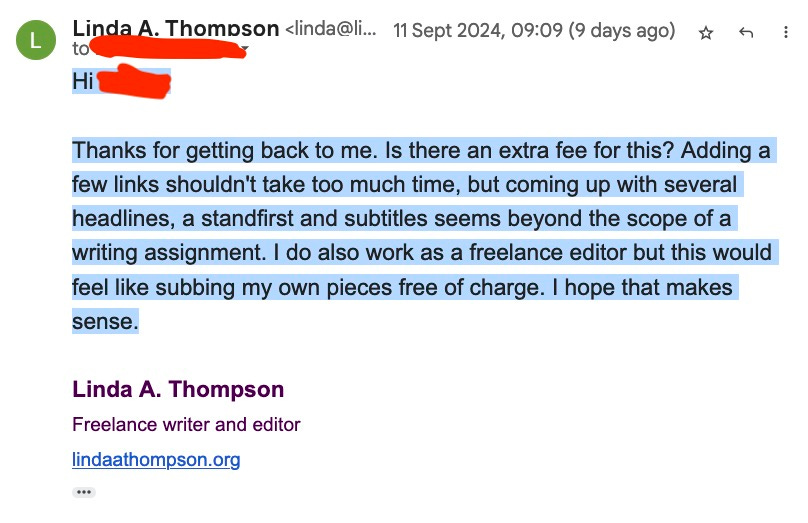A few weeks ago, I pitched a story to a publication that I had only worked with once before. They pay a measly €250 ($279) for an 800-word story, but the previous time I worked with them the editing process had been a breeze and they pretty much published the story as I filed it. It did take them 61 days to pay me after I submitted my invoice, but maybe this time would be different? 🙏🏽
The editors loved the story idea and were happy to commission it, so I asked them whether they could bump up the rate, as I always do. Predictably, they said ‘no’. 🙄
So, I decided to narrow the original scope of the piece, interview fewer people and do less research. They were okay with that and I got to work.
After I filed the piece, the editors asked me whether I could come up with a few suggestions for a headline, write an introduction and add several subtitles to the piece.
It would probably have meant an extra half hour of work, but given the poor rate I was being paid, I did not want to do this extra labour for free. This type of stuff is also typically done by editors, not writers, in the world of Anglo-Saxon journalism. I wrote them back and said ‘no’. I reworked the email a few times to make sure it made a sound argument and that I didn’t come across as passive-aggressive.
Curious what I actually wrote? I’m feeling very transparent today, so here we go:
Silence ensued. After 8 days, the editor emailed me back to say that they would handle it themselves and that they “work with many freelancers, and this is the first time somebody has made a problem with this”.
A few other emails were exchanged after that on minor editing stuff. The editor’s final email was a five-word phrase – no punctuation, no greeting, no goodbye. It was, let’s be honest, the closest they could have come to giving me the finger over email.
That final email tensed me up for a few hours, but mostly I thought: good riddance.
Why didn’t I care that they seemed so obviously annoyed with me?
They’re a small publication that has admirable editorial goals but is happy to pay freelancers exploitative rates to help them meet those goals.
I don’t want to work with them ever again.
Their edit of my piece wasn’t great. They added a sentence that could be described as confusing at best, inaccurate at worst; duplicated language I had used higher up; while another edit had me sound like a non-native writer. I fully admit these are minor quibbles, but an editor’s whole job is to make a writer’s piece better, not clunkier.
I had filed a solid, well-reported story; I was responsive throughout and unfailingly polite in my interactions with them.
Case closed.
I fielded a second unreasonable request recently, but this one came from one of my oldest clients. We go back 13 years and have grown together as I figured out freelancing and they learned to work with freelancers in parallel.
Still, when as part of a massive assignment I’d been working on for weeks, they made what I considered to be an unreasonable request that had the potential to take the assignment well outside of its original scope, I was annoyed.
So, again, I emailed them to say that I was concerned about this extra ask and what it would mean for the rate we’d agreed on. I would share an image of that email too, but it was in Dutch.
Lo and behold what happened next, readers. They emailed to say they fully understood, and that they would be happy to offer additional compensation if I judged that to be necessary. My email to them was just as polite and firm, but the response was clearly … very different.
So, if you ever needed permission, here is mine: set boundaries, set all the boundaries you want. Make sure your work is top-notch, be unfailingly polite, back up your boundaries with sound arguments and off you go.
Just because we’re freelancers doesn’t mean clients can ask us to do whatever. Yes, there is often an imbalance of power and you never want to burn bridges, but clients are people, too. Sometimes they make unreasonable requests simply because they’re used to working with salaried people, not realising that they can’t just tack stuff on like that when working with freelancers.
Or maybe, they’re used to working with freelancers who – for whatever reason, age, scarcity, personality etc. – feel they can’t say ‘no’ to their requests, and they’ve gotten used to that kind of dynamic. I don’t know what’s going on on the client’s side; I just know that if I’m asked a question, I should be allowed to say … no? And, more importantly, not obsess that a client will put me on a black list of “difficult” to work with freelancers?
If you ever find yourself feeling daunted about putting boundaries in place , remember that you’re also doing it for other freelancers. By drawing a line in the sand, you’re making it easier for the next person who works with that same client to push back when we are not treated as the professionals we are and whose work deserves fair compensation.
Over to you! Please tell me about the crazy requests you’ve fielded from clients, what language you used to push back and how that client took it. (I might publish your responses in a future newsletter, so if you don’t want me to identify you, please say so.) Also, if you read this far, you are probably enjoying this newsletter and might want to consider joining the lovely group of people who have supported it by buying me a virtual coffee? You can do that here.
Your comrade,
Linda
What The Friendly Freelancer readers are saying:
It makes perfect sense to work when you need to work (none of these distractions existed when I first started working and it was a more productive time in a way). I always treat looking at social media or messages as a 'break' from work and I get up and wander around with my phone, but I don't find it relaxing ... must address that. – Fellow 😀 Lynda A Thompson in response to ‘Creativity + freelancing + notifications = 0️⃣ work done’
I actually got so many great tips for untethering after sending out that newsletter. I can’t publish them all, but here are some of the best recommendations:
Putting your phone on silent, and turning the sound up only when expecting a “very, very” important call.
Using “Focus” mode on iPhone.
Telling important people in your life not to call during work hours. If they do, pick up and say: “Grandma, I’m working. Did something happen?” If the answer is no, remind them of your rule and lovingly hang up. 😂
Putting your phone on “do not disturb”. But this person also confessed that even though it isn’t, that feels “very radical” to do.








I love this! Thank you for sharing & for the transparency, it's so important to maintain boundaries as a freelancer.
Yes to all of this! Well said Linda.